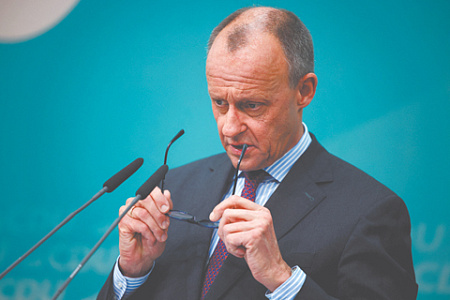
Despite the traditional carnival, when any political activity in Germany freezes, active, though still informal consultations are underway in Berlin on the formation of a black-red coalition of representatives of the conservative bloc of the Christian Democratic and Christian Social Unions (CDU/CSU) and the Social Democratic Party of Germany (SPD). The main problem of the new government will be finding financial resources. Due to their shortage, the previous Cabinet of Ministers did not approve the budget for 2025.
In his election promises, the leader of the CDU, who won the early elections, Friedrich Merz, adhered to the line of preserving financial stability in the country, defending the constitutional “debt brake.” This provision is laid down in two articles of the German Constitution – 109th and 115th. They provide for a balanced budget in terms of income and expenses. According to the Basic Law, debt should not exceed 0.35% of GDP.
However, during the years of the state of emergency, the law is suspended. In 2022, under the pretext of opposing its own defense, the then cabinet of Olaf Scholz managed to overcome opposition resistance by two-thirds of the votes in the Bundestag and adopt a special military budget of 100 billion euros.
Realizing that he would not be able to get his initial proposals for balancing the budget by reducing social spending into a coalition agreement with the Social Democrats, Merz changed his attitude towards the “debt brake” and went towards the SPD. This gave the Greens a reason to talk about Mertz deceiving their voters.
Although Merz’s likely election as chancellor in mid-April by the Bundestag is still more than a month away, the CDU leader is developing extraordinary activity to show that there is a capable leadership in Germany. His recent blitz visit to Paris and talks with French President Emmanuel Macron are clear proof of this.
Thanks to the changed position following the visit to Paris and negotiations with SPD leader Scholz, Merz faces the prospect of creating two specialized extra-budgetary funds, through which the future government will finance military assistance to Ukraine, the rearmament of the Bundeswehr and solving the problems of the German economy. The National Security Council, within the framework of the Federal Chancellor’s office, will determine plans on defense issues. It is this body that will determine all the spending directions of the new specialized extra-budgetary fund. Its size, according to preliminary estimates, will reach half a trillion euros.
Merz’s main problem as chancellor will be the creation of extra-budgetary funds, which will require approval by two thirds of the votes of the new Bundestag deputies. So far, it is known that the right-wing populists from Alternative for Germany are categorically opposed to an increase in military spending. It is unknown what position the Left-wing Party, which has condemned Russia’s aggression in Ukraine, will take.
In the ranks of the Greens, after Annalena Berbok’s resignation from the post of foreign Minister and possible retirement from politics, there are processes of demarcation and the return of the party to the former far-left positions of the 1970s is not excluded. With this development, Merz is unlikely to be able to realize his intentions in strengthening the country’s defense and strengthening military support for Kiev.
